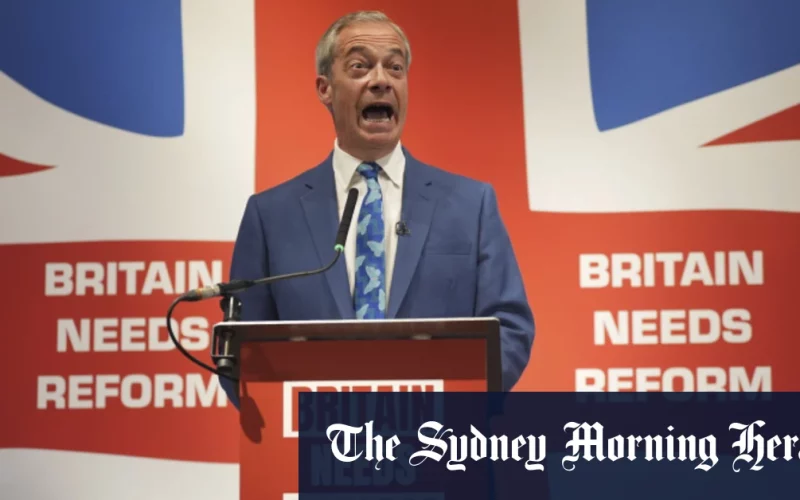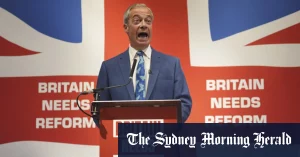In the volatile landscape of British politics, the return of Nigel Farage, the charismatic leader of the Brexit Party, holds profound significance. As the Conservative Party faces the specter of heavy defeat, Farage’s resurgence injects a new dynamic into an already tumultuous scenario. This article delves into the reasons behind Farage’s comeback and its implications amidst the Tories’ electoral struggles.
The Resurgence of Farage
After a brief hiatus following the Brexit referendum, Nigel Farage has made a striking return to the forefront of British politics. His decision to re-enter the fray underscores his unwavering commitment to the cause of Brexit and his belief in its enduring relevance. Farage’s reemergence has reignited debates surrounding key issues such as sovereignty, immigration, and national identity, resonating strongly with a segment of the electorate disillusioned with the Conservative government’s handling of Brexit.
Impact on the Conservative Party
For the Conservative Party, Farage’s return represents a formidable challenge. With internal divisions over Brexit persisting and public confidence waning, the Tories find themselves grappling with a crisis of leadership and direction. Farage’s ability to galvanize support among disaffected voters threatens to further erode the Conservative base, potentially tipping the scales in favor of rival parties such as Labour or the Liberal Democrats.
Analysis of Farage’s Appeal
Farage’s enduring appeal lies in his ability to tap into deep-seated sentiments of resentment and disenchantment within certain segments of the electorate. His populist rhetoric, coupled with a no-nonsense approach to politics, strikes a chord with those who feel marginalized or ignored by the political establishment. Farage’s uncompromising stance on issues such as immigration and national sovereignty resonates particularly strongly in post-Brexit Britain, where concerns about identity and control loom large.
The Role of Farage’s Comeback in Shaping Electoral Dynamics
Farage’s return not only impacts the Conservative Party but also reshapes the dynamics of upcoming elections. His ability to mobilize disenchanted voters, particularly in traditional Conservative strongholds, has the potential to disrupt electoral outcomes significantly. With Farage’s Brexit Party rebranding itself as the Reform Party and broadening its agenda beyond Brexit, it presents a multifaceted challenge to established political forces. By tapping into broader issues of governance, accountability, and societal change, Farage aims to capitalize on the growing disillusionment with mainstream politics, positioning his party as a viable alternative to the status quo.
The Future of British Politics in the Wake of Farage’s Comeback
As Nigel Farage reasserts his influence on the political landscape, questions abound regarding the future trajectory of British politics. His comeback underscores the enduring salience of populist narratives and the challenge they pose to traditional political structures. Whether Farage’s resurgence heralds a realignment of political allegiances or merely exacerbates existing divisions remains uncertain. However, what is clear is that his return injects a renewed sense of urgency into debates surrounding issues of identity, sovereignty, and the future direction of the United Kingdom. As Britain navigates the complexities of a post-Brexit era, Farage’s presence looms large, shaping the contours of political discourse and the choices facing voters in the years to come.
Comparative Analysis
| Factors | Farage’s Comeback | Tory Defeat |
|---|---|---|
| Leadership Crisis | Farage offers a strong, charismatic leadership alternative. | Tories suffer from a lack of cohesive leadership, contributing to voter disillusionment. |
| Brexit Agenda | Farage champions a hardline Brexit stance, appealing to Brexiteers unhappy with Tory compromises. | Conservative approach to Brexit lacks clarity and has alienated both Leavers and Remainers. |
| Voter Base | Farage consolidates support among disaffected voters, potentially siphoning votes from the Conservatives. | Traditional Tory support base erodes due to dissatisfaction with party policies and leadership. |
Conclusion
In conclusion, Nigel Farage’s resurgence on the political scene carries significant implications for the Conservative Party and the broader landscape of British politics. As the Tories grapple with the prospect of heavy defeat, Farage’s ability to rally support around his uncompromising Brexit agenda poses a formidable challenge. Whether his comeback heralds a seismic shift in the political landscape remains to be seen, but one thing is clear: Farage’s return injects fresh uncertainty into an already turbulent political climate.












